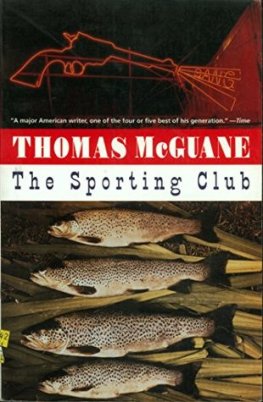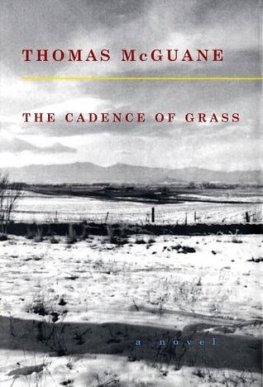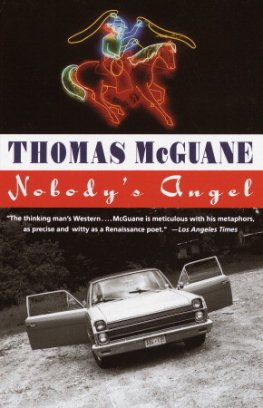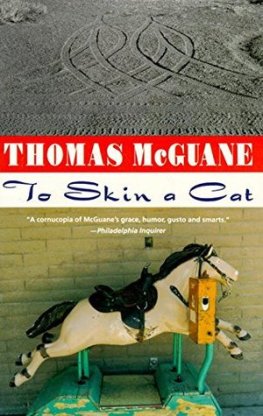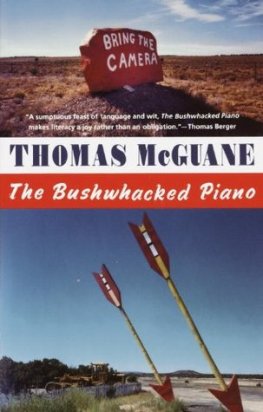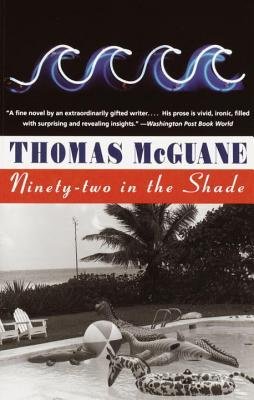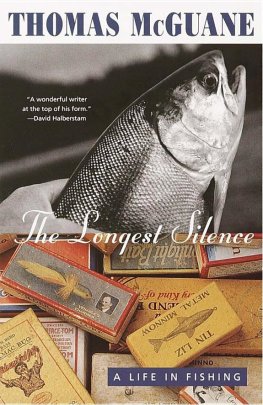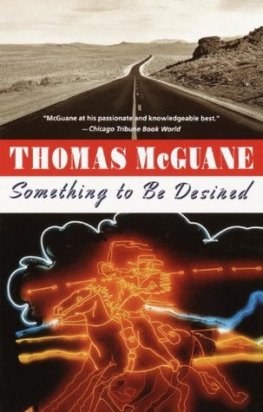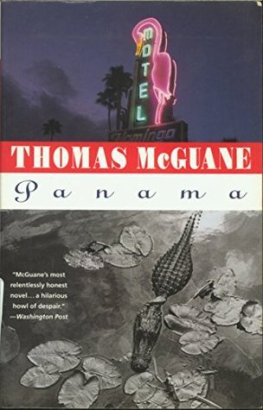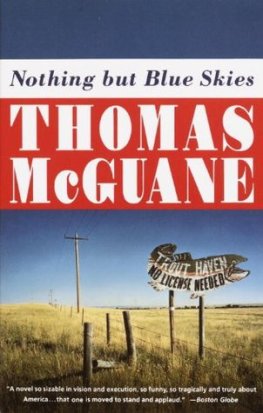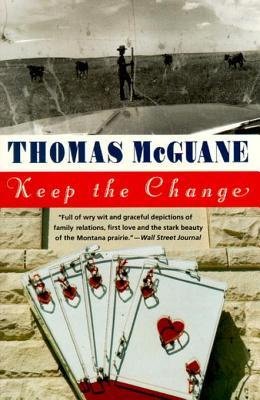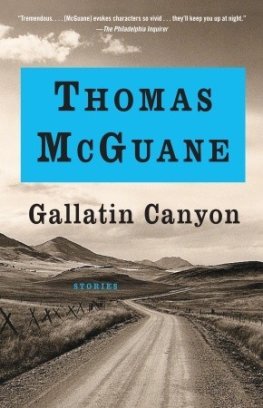Thomas Mcguane
The Sporting Club
Whirl is king.
ARISTOPHANES
BLUCHERS Annals of the North (Grand Rapids, Michigan, 1919) which perforce omits the human element and which minces the few words at its disposal, has this to say:
Centennial Club (formerly the Shiawasee Rod and Gun Club): Grandest of the original sporting clubs of the Northern Lower Peninsula, founded by the barons of lumbering who logged off the white pine stands of the Saginaw Country. Its charter was written in 1868 while the big timber was being converted to pioneer houses on the treeless prairies of the West. The operations of the Centennial Club are shrouded in well-guarded mystery. Nothing is known of its procedures but that membership is handed from fathers to eldest sons. The vastness of the Centennial land holdings is widely known: they extend from the Pere Marquette to the Manistee. A mounting body of evidence has pointed to the clubs large influence in state and local politics. The grounds include many buildings of interest, principally the MAIN LODGE***** which is a distinguished early example of G. K. Truaxs country style though much modified both by the capricious architectural tastes of early-time lumber barons and by the use of amateur Indian labor. Nearby are some smaller club buildings worth the visitors attention. These include the GAZEBO**** and a well-constructed TOOL-SHED.* Tours are occasionally arranged during winter months.
Blucher is a little misleading (there has never been a tour); and like so many clubs, the Centennial Club has suppressed an accessible luxury in favor of roughing it. Anyone looking for splendor would find it plain. Even the tool-shed disappoints.
This morning, two men rode along the sandy miles between the front gate and the upland slope upon which the club had located its buildings. Jack Olson, the manager of the club, drove the jeep with certitude over the disrepair of the road. James Quinn sat beside him and studied the woods. Behind the two, just unloaded from the clubs twin-engined Beechcraft, loomed Quinns gear. Quinn was here to rest and that always seemed to require a lot of equipment; though if Vernor Stanton was here no amount of it would save him. A sharpshin hawk wheeled low into the blue strip of sky over the road, its long legs trailing a brown curve of mouse, flew ahead of them for a moment and swung into the woods again. Quinn was beginning to see how he could be chiseled out of his recuperation and he was afraid to ask about Stanton. He knew he would have to ask; but it was a minute before he could go through with it.
All right, Quinn said, tell me.
Hes here.
Is he.
They drove on. Quinn stared at the double gearshifts of the transmission and transfer box.
He has his wife with him, you know, Olson said.
So you think that will help.
Well, so much of the old trouble started
Yes Quinn encouraged.
With women, right?
Thats your boy. Whew. Thats what I was thinking.
And if he could just Olson began anew, encouraged.
Say it, Jack. If he could just?
Get his ashes hauled about sixty times a day
Easy now. You think that would quiet him? Well, I do too. That would quiet most anything, wouldnt it? After all?
I guess. Olson was lost in thought.
I mean just what kind of a girl is this?
Oh, no. Just a girl. But I mean, something, right? Wouldnt you think? Nobody sees him. Hes been very quiet. Quinn agreed. He gazed out upon the familiar savannahs and stands of pine slashing. Then they turned onto a narrower road so frequently marked with rain-pools that Olson engaged the four-wheel drive. Now cedars were around them and the road was very slightly flooded so that when they hit clay and the rear end swam a little, Olson accelerated to bring it back in line. The ferns made their false floor in the woods and every shaft of sun was whirling with insects. They climbed again slowly.
One other thing though. He built this dueling gallery in his basement. Quinn looked at Olson. They were coming now along the last climb to the plateau.
For what? he asked. Olson turned his thin, intelligent face against the light and looked away from Quinn as though this were the first time he was giving it real consideration. The jeep bucked under them lightly.
Eventualities, Olson said as if picking up the word in his hand. Quinn recognized Stanton in this. God help us, he thought. They stopped in front of the main lodge.
Ill go see for myself. Behind the lodge was the forest. In front of it was a wide, manicured green compound encircled by a cliff of heavy pine. The main lodge was an immense three-story building with a bleached and shallow blue-gray mansard roof. In the middle of the compound was an octagonal screened gazebo called the Bug House, and beside it a tall metal flagpole with its slack ropes hitting musically. Quinn made arrangements for his place to be aired and swept and for his mail to be brought down. Then he headed down the dry, beaten trail that led out of the compound to Stantons place. In a minute, he stopped for a nervous easing of his bladder, then went on where trees crowded, tall sunless pines blown out of the ground like jets of dark gas. Stantons house was virtually without a yard. Quinn walked out of the woods three feet and was against the first step of the porch. He had gotten just this far when Stanton stepped, or rather thrust, out onto the top step. His muscular frame was covered only by the pleated linen shorts he wore and sweat ran down his chest. In his right hand hung a dueling pistol. The true Quinn, he said in his heroic manner; this is an ugly surprise. Quinn ascended the steps.
Ive come to meet your new wife since you never troubled me with a wedding invitation.
Well, come on in and introduce yourself to her. He turned back into the darkness. Dats what I do all de day long. Janey! he called. Janey! He led Quinn down the hall. Off on one of her peerless nature jaunts. Quinn plunged his hands in his pockets and followed the barefoot and sweating Stanton. Head of moose, Stanton said with a rotary movement of his left hand as he passed the trophy. They crossed the big, timbered living room. Doorway to improved cellar.
Quinn followed Stanton down headlong steps to a lighted cellar. Odors of fresh paint, fiber insulation and dampness combined strangely. The first room was a bar and library with books, many of them good editions, swollen with moisture and neglected. Stanton made drinks and led Quinn into the next room, the dueling gallery. This was a serious place, painted like a ships boiler room and lit like a surgical theater with a long row of egg-crate nonglare lights. They filled the room with a delicate electrical hum. At either end of the room were human silhouettes. Each had a red circle around the heart that enclosed the numeral ten. The other regions of the body were similarly defined with black perimeters that enclosed smaller numbers. Quinn considered it a stroke of surprising romanticism to award the heart ten points. A modern target would indicate a grand slam for the straight shot, from behind, to the skull, or perhaps a combination parlay for a disabler to the spine and finishing shot through the roof of the mouth. These targets had faces which were serene and Mediterranean and their eyes followed you around the room waiting to be shot.
Admit Ive improved the cellar, said Stanton, and Quinn felt he was stalling. Next to the entrance was a cabinet and he pulled open its door. Come look here. Inside, on small felt-covered hooks, a dozen pairs of dueling pistols hung upside down by their trigger guards. Stanton took down a pair and handed one to Quinn. French and without price. Made by Jean Baptiste Laroche, Paris, middle eighteenth century. They came with jasper flints which were purely decorative and had to be replaced. There is a fitted case for the convenience of the seconds who carry the instruments to the scene of the crime as if it were no more than a Dopp kit; a powder flask of the thinnest possible gold, instruments for cleaning and a mold that casts six perfect bullets at a throw.

